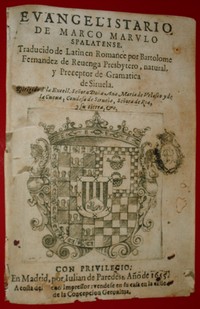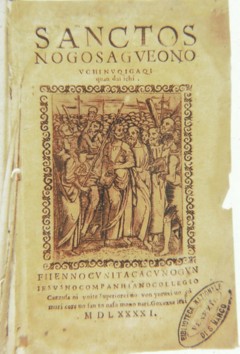Among Croatian Latinists and writers in Croatian a central place is occupied by Marko Marulic, who is the "father of Croatian literature" (born in Split, 1450-1524). He was the most famous spiritual writer of his time in Europe, and also the first who defined and used the notion of psychology, which is today in current use. 
Source
His book De institutione bene vivendi (six volumes, 64 chapters), published in Venice in 1506, had fifteen editions until 1686 and was translated from Latin into - Italian
- German (five editions between 1583 and 1614, all in KĂśln, in parts already in 1568)
- French (7 editions, the first one in 1585)
- Flemish
- Japanese (in Nagasaki, in parts, 1585)
- Portuguese and
- Czech,
altogether 40 editions. It is well known that St. Francis Xaver had taken only two books on his long pilgrimage to the East (India, Japan and China): the Bible and De institutione. Furthermore, in his testament St. Francis Xaver asked that Marulic's book be buried with him. Therefore we may conclude that Marulic was a spiritual father of St. Francis Xaver.
St. Francis Xaver's personal sample of Marulic's book was kept in Madrid in a collection of valuables until 1937, when it had dissapeared. St. Ignazio Loyola included De Insitutione into the list of basic references for the formation of Jesuits. Both St. Francis Xaver and St. Ignazio Loyola were Basques. According to investigations of a French specialist Charles Bene, Marulic's texts have been used extensively by Thomas More and Henry VIII. It is known that Marulic's "Evangelistarium" that was read by Henry VIII bears many comments by the King. It is considered that two of the king's three literary works were written under the influence of Marko Marulic. Charles Bene has translated Marulic' Judita from Croatian into French (La Judith).
A page of Marulic's Evangelistarium annotated personnaly by the English King
Henry VIII, kept in the British Library (843 K 13), see Charles Bene:
La reception des oeuvres de Marulic dans les provinces du Nord ,
in Colloquia Marvliana IIII, Knjizveni krug, Split 1994., p. 51 
Marko Marulic's Evangelistarium published in Spanish in Madrid in 1655. Note Croatian Coat of Arms in the middle. Photo exhibited by The Split Literary Circle.
Marulic's poem "Carmen de Doctrina Domini Nostri Jesu Christi pendentis in cruce" was translated into English as "A Dialogue betwext a Christian and Christ hanging on the Crosse" by St Philip Howard, Earl of Arundel (1557-1595). According to C. Verdiani, Marulic is also the author of the Florence Codex, which contains a biography of St Jerome written in the Croatian language. There he wrote St Jerome is our Dalmatian, a glory, honour and fame,
and a brilliant crown of the Croatian language.In Croatian: Jerolim je nass Dalmatin, on je dika, posstenje i slava i svitla kruna hrvatskoga jezika. Marulic's verses appeared printed in the Glagolitic Script alreday during his lifetime, in Transit of St Jerome (Transit sv. Jerolima), published in the town of Senj in 1508 under the title of Anjelske kriposti, in 144 doubly-rhymed dodecasylabic (ie 12 syllabic) lines. These verses, transcribed into the Glagolitic from the original Croatian text in Latin script, can be found by the end of the book. Many thanks to academician Anica Nazor for this information (2007). Here is a part of describing wisdom of St Jerome, see [Bratulic, Il poeta Marco Marulic e la tradizione glagolitica in Croazia, p 232]: Bog razum skupi u njem tr izvrstnu mudrost,
Sveta Pisma po njem da prosine svitlost,
Prorokov otajna, Kristove pritaci
Nam su sad nahajna, jer je on stlmaci.
Vsu knjigu latinsku i grcku umise
I osce ijudejskuâ |
Older Croatian Glagolitic Transits of St Jerome have been studied by [Stefanic]. Marko Marulic sent a dramatic letter to the Pope Hadrian VI, describing an extremely tragic position of the Croats threatened by the onslaughts of the Ottoman Empire and asking for help.
Jean Garret (Ioan Garetij) of Louvain, in his writing De era praesentia corporis Christi in sacrmaneto Eucharistiae, 1561, cites Marko Marulic His books were known not only in the whole of Europe, but also in Japan (in the 16th century) and South America. For example, parts of De institutione bene vivendi were translated into Japanese already in 1585, published in parts in Nagasaki under the title Sanctos no gosayuno, see Franolic (he mentions 1595 instead of 1585). More than 500 copies of Marulic's books are kept in Germany (60 libraries), from Franz Leschinkol: Povijesna uloga Evandjelistara i Institucije u 16. stoljecu, in Colloquia Marvliana IIII, Knjizveni krug, Split 1994., pp. 90 and 193 Alonso de Villegas, Spanish author of a famous book Fructus Sanctorum (printed in Paris in 1624), refers to Marulic's De Institutione on almost every page. Another Spanish Christian humanist, Juan Lorenzo PalmiernoĂĂĂĂĂÂ (Laurentius Palmyrenus), in four of his texts published between 1564 and 1578 mentions expressly to be inspired by Marulic's books. Moreover, in one of his dramas there is a figure called "Marulus". And Professor Michael Neralich (lecturing Spanish and comparative literature at the University of Clermond-Ferrand) considers that the figure of "Andrea Marulo" in the novel Trabajos de Persiles y Sigismunda by Cervantes is inspired by Marulic. There is no doubt that Cervantes was familiar with Marulic's books, since they were translated into Spanish by Fernandez de Ruenga. In the Library of Cristoph Columbo in Sevilla, founded by Hernando Colon (son of Cristoph Columbo), there are many books by Marko Marulic, and even his "Judita" written in Croatian! 
Sanctos nogosagveono, 1591, written in Japanese language and in Latin script, contains Marulic's texts; see Franz Leschinkol: Povijesna uloga Evandjelistara i Institucije u 16. stoljecu, in Colloquia Marvliana IIII, Knjizveni krug, Split 1994., pp. 98
One of Marulic's tractates has been translated into Icelandic in 1601. When St. Francis Xaver arrived to Kogoshima in Japan in 1549, he also brought Marulic's "De insitutione bene vivendi". According to bishop Hamao from Yokohama, president of Japanese Bishop's Conference and of Asian Caritas, the formation of earliest Japanese Christians had been very probably based on the spirituality of Marulic. See here (in Croatian). It is interesting that in Berlin a monument of Marko Marulic was set up in 2000. In the Library of Congress, Washington, a symposium was held devoted to his work. - Marko Marulic, Humanist from Split
- Marko Marulic - Marcvs Marvlvs (in French), by Mirko Tomasovic, translated from Italian by Charles Bene
- MARVLIANVM, Centar za proucavanje Marka Marulica i njegova humanistickoga kruga, Split
- Marko Marulic: De insittutione bene vivendi (scrollable book), National and University Library, Zagreb
- Marko Marulic: Judita (scrollable book), National and University Library, Zagreb
- Epistola domini Marci Maruli Spalatensis ad Adrianum VI. Pont. Max. (scrollable book), National and University Library, Zagreb
- Colloquia Maruliana
- Bratislav Lucin (ed.): The Marulic Reader, Knjizevni krug Split Marulianum, Croatian World Congress, Split 2007., ISBN 978-953-163-284-3
- Bratislav Lucin: Marko Marulic 1450-1524, Zebra plus, Split 2008., ISBN 978-953-96566-4-3, in Croatian and German
- Zvonko Pandžić: Nepoznata proza Marka Marulića, Tusculanae editiones, Zagreb 2009., ISBN: 978-953-95144-6-2; the monograph is described by Stjepan Krasić: K rješenju marulićevskog pitanja [PDF], Filologija 54, Zagreb 2010.
|